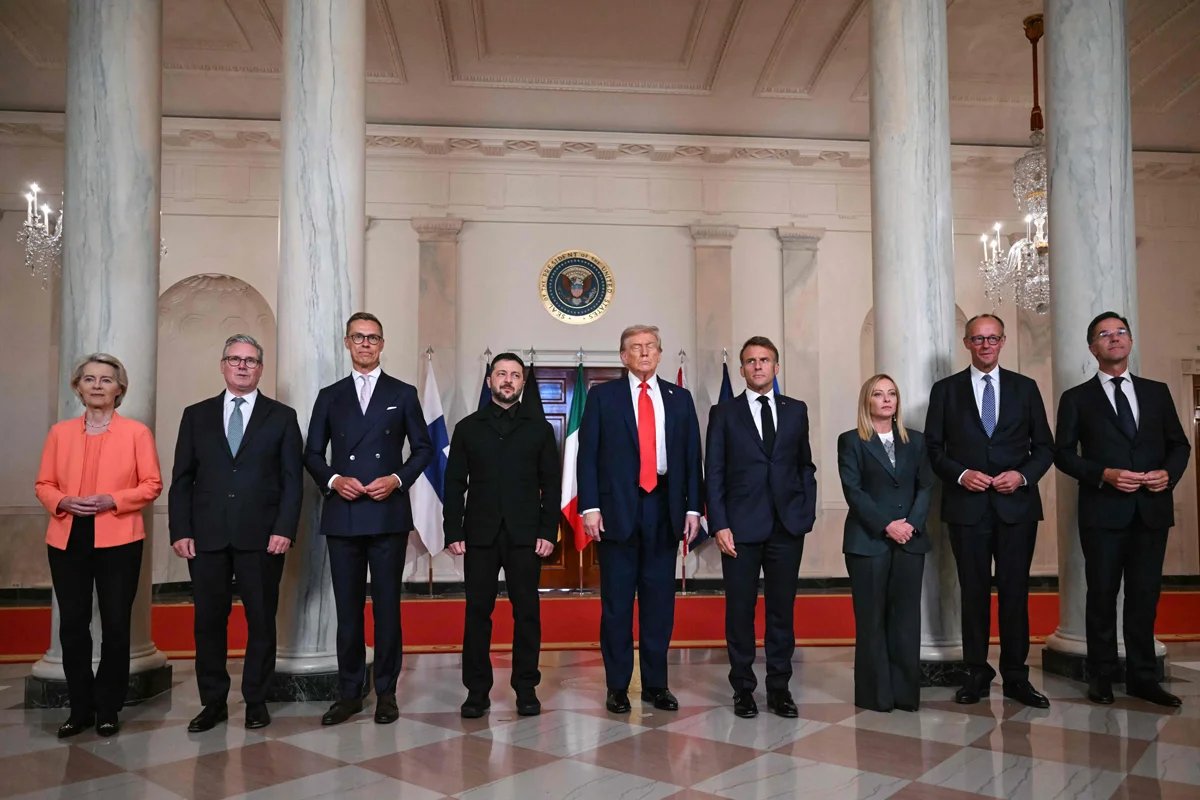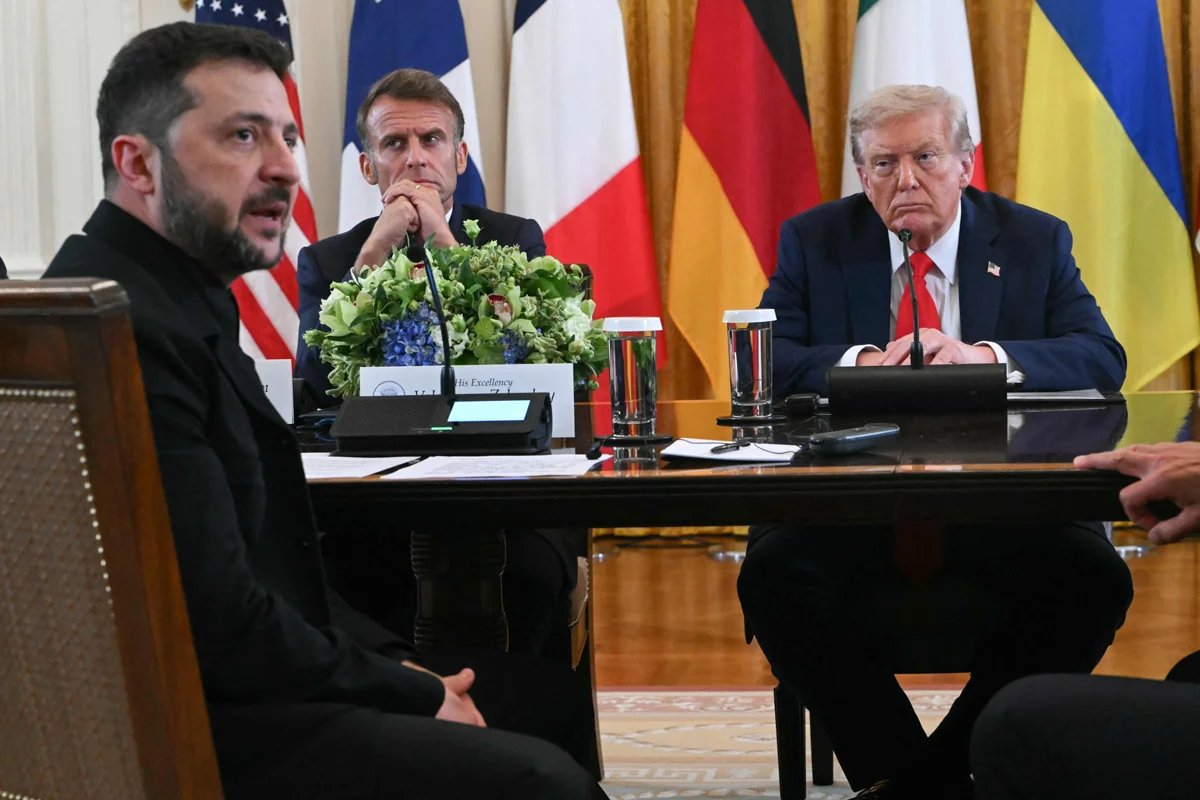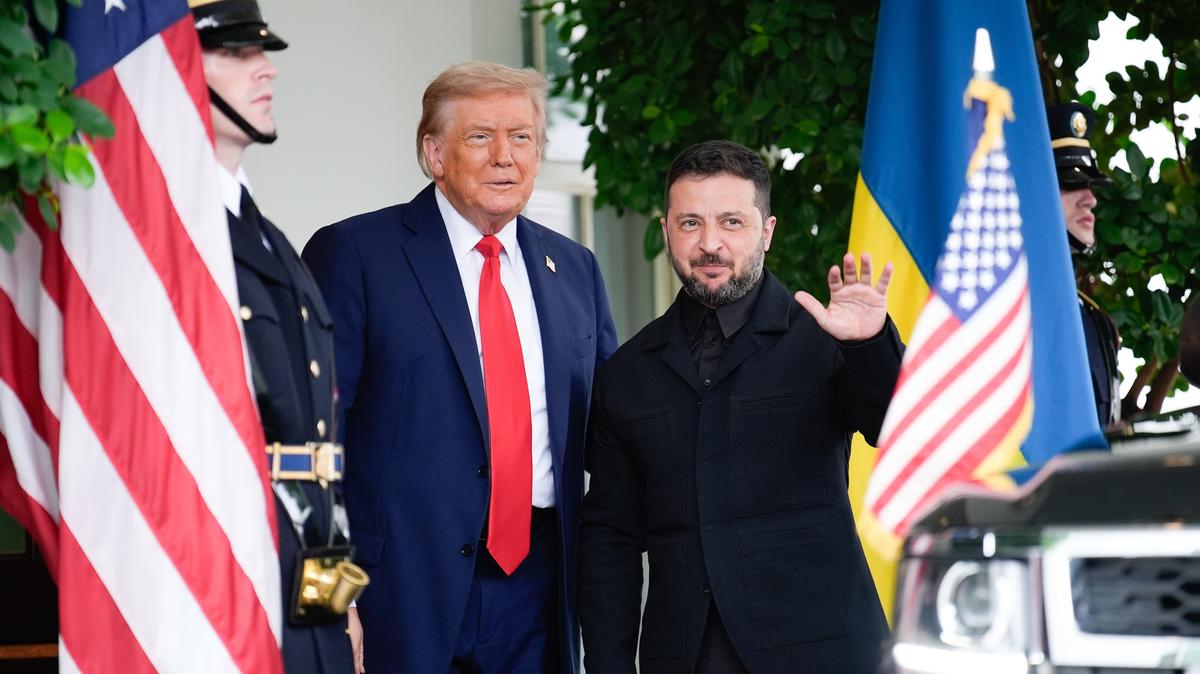Following Monday’s extraordinary multilateral talks at the White House between US President Donald Trump, Ukrainian President Volodymyr Zelensky and seven of Europe’s most powerful leaders, it transpired that Trump was attempting to engineer an in-person bilateral meeting between Putin and Zelensky in the coming weeks.
Though the Kremlin has not yet officially accepted Trump’s proposal, AFP subsequently reported, citing a person with knowledge of a phone call between Trump and Putin on Monday, that Putin had told Trump he was indeed “willing” to meet Zelensky.
While the potential location of any meeting between the two enemies is yet to be determined, Axios journalist Barak Ravid reported on Monday evening that the hope was “to do the Putin-Zelensky meeting by the end of August,” citing an anonymous source “with knowledge”.
During the talks at the White House on Monday, Trump called Putin, according to Russian news agency RIA Novosti, who reported senior Putin aide Yury Ushakov as saying that their “frank” and “very constructive” conversation had lasted about 40 minutes, and that all parties had “expressed their support for direct negotiations between the two countries”.

EU Commission President Ursula von der Leyen, UK Prime Minister Keir Starmer, Finnish President Alexander Stubb, Ukrainian President Volodymyr Zelensky, US President Donald Trump, French President Emmanuel Macron, Italian Prime Minister Giorgia Meloni, German Chancellor Friedrich Merz and NATO Secretary General Mark Rutte pose at the White House in Washington, 18 August 2025. Photo: Andrew Caballero-Reynolds / AFP / Scanpix / LETA
Trump later confirmed that he had called Putin and had discussed a possible location for talks with Zelensky, noting that a trilateral summit with Trump was planned after that meeting. “This was a very good, early step for a War that has been going on for almost four years”, Trump later wrote on Truth Social.
The view from Kyiv
Ukraine-based political analyst Georgy Chizhov noted that both Ukraine and Europe had made it clear that they were prepared to accept the freezing of the frontline but that they were not ready to acquiesce to Putin’s demand that Kyiv completely withdraw its forces from the parts of the Donetsk and Luhansk regions still under its control.
While Russia may “still have a lot on its wish list”, Chizhov said that “if Putin is ready to be satisfied with current territorial acquisitions, without their legal recognition” an agreement could be made.
Chizhov also noted that Ukraine would already be offering colossal territorial concessions if it agreed to recognise 20% of its territory as occupied by Russia and potentially agreeing not to seek the return of those territories by force under the terms of a potential peace agreement.
This would be a far cry from Kyiv’s position in 2023, when its goal was to recapture all the land seized by Russia since the start of the full-scale invasion, and to return to Ukraine’s 1991 borders, which included Crimea.
Zelensky appeared to have learned from his disastrous meeting with Trump at the White House in February and behaved very diplomatically.
From Chizhov’s perspective, demanding more concessions from Ukraine would be “stupid and unfair”, given how much Ukraine is now willing to concede.
According to Chizhov, Zelensky appeared to have learned from his disastrous meeting with Trump at the White House in February and behaved very diplomatically, managing to compliment Trump even when clearly marking his red lines.
Chizhov added that though Zelensky didn’t seem “at his best” before the talks, his demeanour had markedly improved by the end of the meeting, perhaps in no small part due to the presence of the gathered European leaders.
Though Zelensky pulled out of a scheduled appearance on Fox News following the talks, he told reporters gathered outside the White House that the meeting had been his “best” yet with Trump that it had yielded “good” results.
A bilateral meeting between Putin and Zelensky would demonstrate Russia’s willingness to end the war, Zelensky stressed.
Stressing that he would only discuss territorial matters directly with Putin, Zelensky said he was “ready” to meet with the Russian leader, after which a trilateral meeting with Trump would follow.
A bilateral meeting between Putin and Zelensky would demonstrate Russia’s willingness to end the war, Zelensky stressed, adding that if Moscow did not agree to one, Kyiv would ask Washington “to act accordingly”, implying imposing further sanctions on Russia.
No gifts to Putin
According to a classified document from the meeting seen by the Financial Times (FT) on Monday, Ukraine will commit to buy US weapons worth some $100 billion using funds provided by Europe in a bid to obtain US guarantees for its security after reaching a peace settlement with Russia.
According to the document, Kyiv and Washington are to strike a $50-billion deal for the US to produce drones with Ukrainian companies that have pioneered new drone warfare technologies over the past three years of the Russian invasion.
Though the document does not specify which weapons Ukraine is committing to buy from the US as part of the deal, the FT reported that Kyiv had been clear about seeking to purchase at least 10 more American-made Patriot air defence systems to protect its cities from Russian missile strikes.
Notably, the document also stressed that Ukraine rejected the proposal Putin made to Trump in Alaska to freeze the rest of the frontline if Ukraine fully withdraws its troops from the partially occupied Donetsk and Luhansk regions, as doing so would create “a foothold for a further and rapid advance of Russian forces towards the city of Dnipro”, in central Ukraine.
Kyiv also noted that a lasting peace shall be based “not on concessions and free gifts to Putin”, but on a strong security framework that would prevent future aggression, and reiterated its previous position that a ceasefire must be secured before any peace deal.

Zelensky, Macron and Trump during multilateral talks at the White House on 18 August 2025. Photo: Andrew Caballero-Reynolds / AFP / Scanpix / LETA
“Russia’s attempt to settle territorial issues before further talks on a lasting peace agreement would create a fait accompli on the ground while doing nothing to ensure Kyiv’s future security”, the FT wrote.
Lowering expectations
Overall, German MEP Sergey Lagodinsky told Novaya Gazeta Europe, Monday’s White House meeting can be described as a positive one for Ukraine and its allies as another bad-tempered public exchange was avoided and “nobody tried to force Ukraine’s hand”.
“The ball’s in the Kremlin’s court now,” Lagodinsky said, adding that the parties had also begun to clearly formulate how any security guarantees provided for Ukraine in the event of a peace deal might look — another positive development.
However, Lagodinsky added that the arms purchase and drone production deals described by the FT seem “terrible” and “unserious”, bringing “us all back down to Earth with Trump’s mercantile thinking”.
Nevertheless, given the low expectations that most people had ahead of the meeting, this is a positive result, Lagodinsky added, noting that, “we are still dealing with Trump and his team” after all. “The general spirit of cooperation is important. This would have been impossible without the presence of the Europeans and their common strategy.”
Join us in rebuilding Novaya Gazeta Europe
The Russian government has banned independent media. We were forced to leave our country in order to keep doing our job, telling our readers about what is going on Russia, Ukraine and Europe.
We will continue fighting against warfare and dictatorship. We believe that freedom of speech is the most efficient antidote against tyranny. Support us financially to help us fight for peace and freedom.
By clicking the Support button, you agree to the processing of your personal data.
To cancel a regular donation, please write to [email protected]

